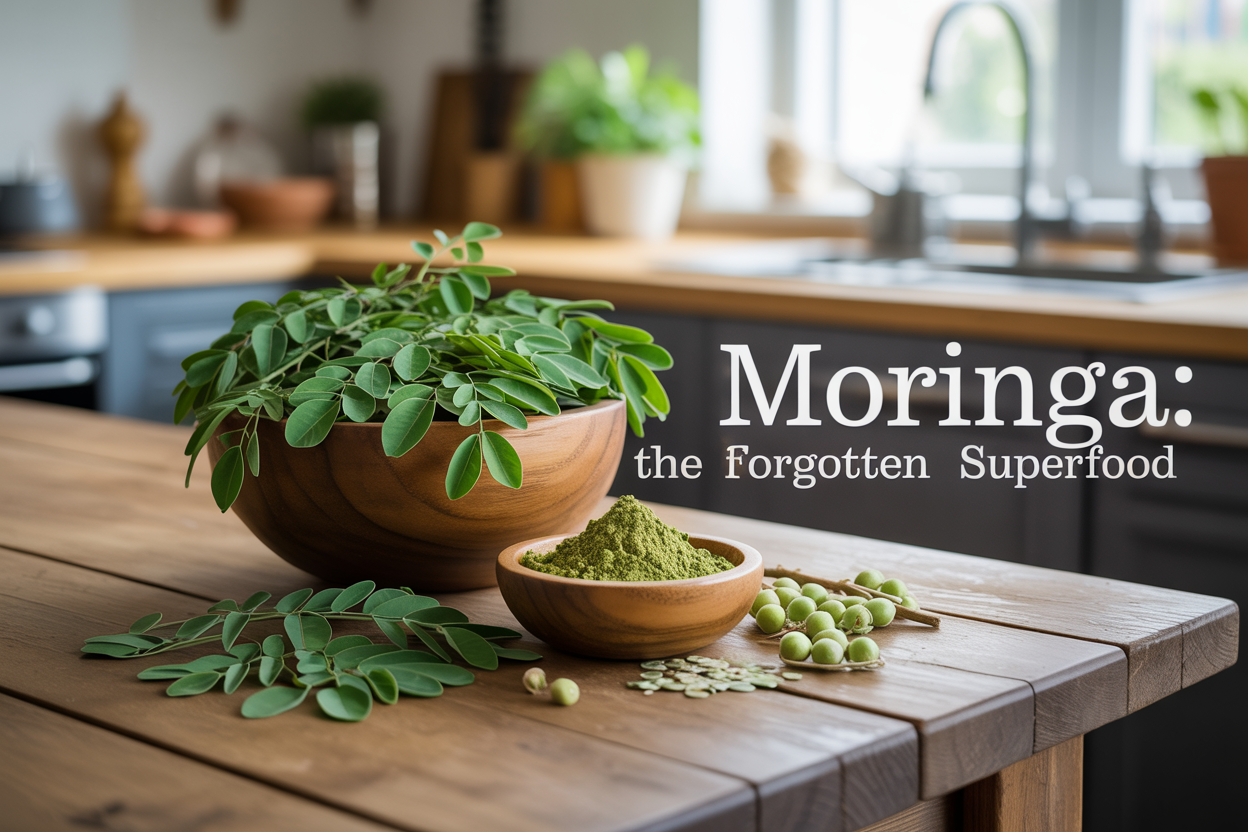
Moringa, often called the “miracle tree,” has quietly been nourishing communities across Africa, Asia, and South America for thousands of years. Now this forgotten superfood is catching the attention of health enthusiasts, busy professionals, and anyone looking to boost their nutrition naturally.
If you’ve been wondering what is moringa and why everyone’s talking about moringa benefits, you’re in the right place. This incredible plant packs more vitamin C than oranges, more iron than spinach, and more protein than most vegetables—making moringa nutrition facts truly impressive.
This guide is perfect for health-conscious individuals who want to understand moringa health benefits without the hype, plus practical advice on how to use moringa in real life. We’ll explore what makes this moringa superfood so nutritionally dense, dive into the science-backed health benefits that could transform how you feel, and share simple ways to add moringa powder and moringa leaves benefits to your daily routine.
You’ll also discover how to find high-quality moringa supplements and even grow your own moringa tree if you’re feeling adventurous. Ready to learn why this ancient superfood deserves a spot in your modern wellness routine?
What Makes Moringa a Nutritional Powerhouse
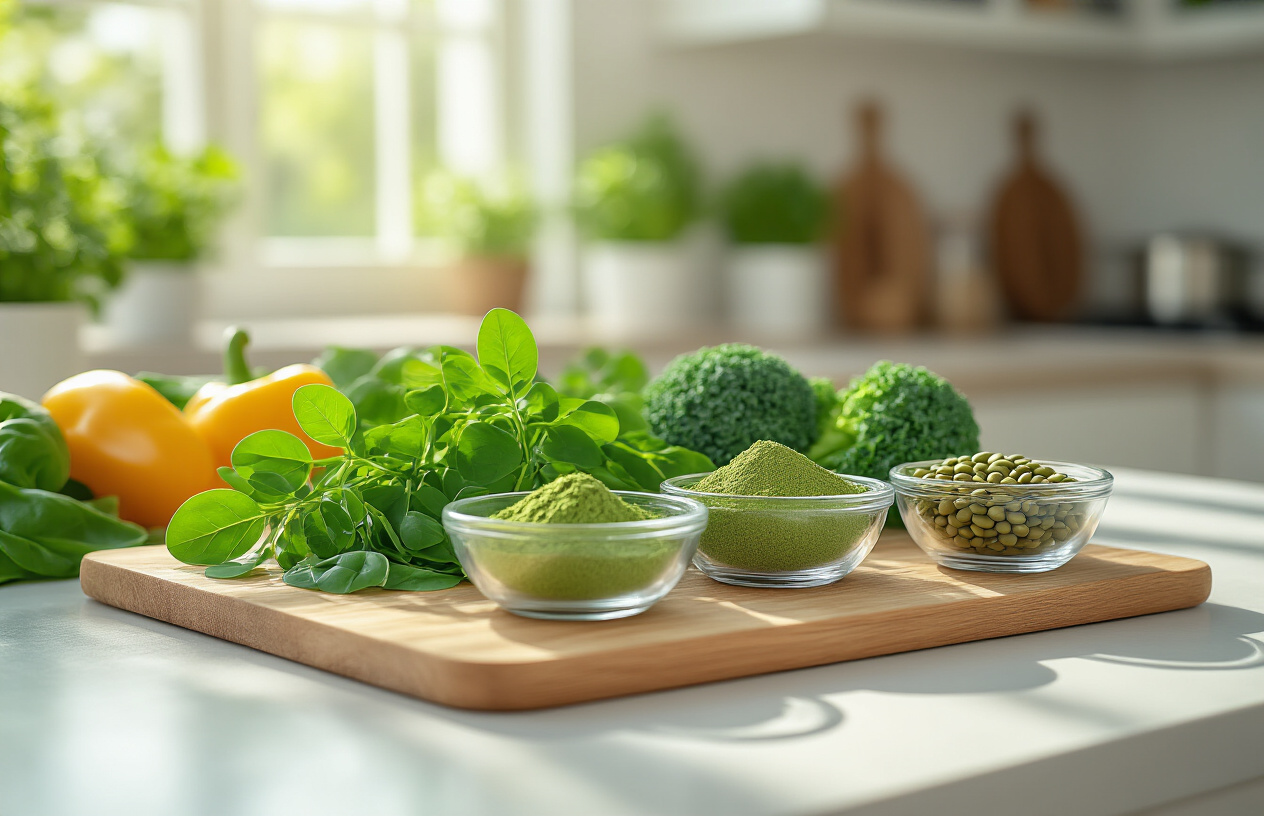
Complete Protein Profile with All Essential Amino Acids
Your body needs all nine essential amino acids to build and repair tissues, yet most plant-based foods fall short of this requirement. Moringa leaves break this rule completely. When you consume moringa powder or fresh leaves, you’re getting a complete protein that matches the quality found in eggs and milk.
This complete amino acid profile sets moringa apart from other plant proteins. While quinoa and buckwheat also offer complete proteins, moringa delivers them in higher concentrations. Your muscles, organs, and immune system can immediately use these amino acids without needing to combine moringa with other foods. This makes moringa particularly valuable if you follow a vegetarian or vegan diet.
The protein content in dried moringa leaves reaches about 25-30% by weight, making it one of the most protein-dense leafy greens you can find. Fresh moringa leaves contain approximately 9 grams of protein per 100 grams, which rivals many legumes.
Vitamin and Mineral Density Exceeds Common Superfoods
When you compare moringa nutrition facts to other celebrated superfoods, the results will surprise you. Moringa leaves contain seven times more vitamin C than oranges, which means a small serving can meet your entire daily requirement. Your immune system gets an incredible boost from this concentrated vitamin C content.
The calcium levels in moringa will particularly impress you if you’re looking for dairy alternatives. Moringa provides four times more calcium than milk, supporting your bone health and muscle function. You’ll also find substantial amounts of potassium, which helps regulate your blood pressure and supports proper heart function.
| Nutrient | Moringa per 100g | Common Comparison |
|---|---|---|
| Vitamin C | 220mg | Orange: 53mg |
| Calcium | 440mg | Milk: 125mg |
| Iron | 28mg | Spinach: 3mg |
| Potassium | 259mg | Banana: 422mg |
| Vitamin A | 6,780 IU | Carrot: 16,700 IU |
Your daily nutritional needs become much easier to meet when you include moringa in your routine. The B-vitamins in moringa support your energy metabolism, while the folate content helps with DNA synthesis and red blood cell formation.
Antioxidant Content Rivals Blueberries and Green Tea
The antioxidant power of moringa leaves will change how you think about fighting cellular damage. Your body faces constant oxidative stress from pollution, processed foods, and natural aging processes. Moringa’s ORAC (Oxygen Radical Absorbance Capacity) score reaches impressive levels that compete directly with renowned antioxidant champions.
You’ll find powerful compounds like quercetin, chlorogenic acid, and beta-carotene working together in moringa. These antioxidants protect your cells from free radical damage that can lead to premature aging and chronic diseases. The chlorogenic acid in moringa helps moderate your blood sugar levels after meals, similar to what you’d find in green coffee beans.
Moringa’s antioxidant profile includes flavonoids and phenolic compounds that support your cardiovascular health. When you consume moringa regularly, these compounds help reduce inflammation throughout your body. The combination of different antioxidants creates a synergistic effect that’s more powerful than any single compound working alone.
Bioavailable Iron for Enhanced Energy and Immunity
Your body can actually absorb and use the iron found in moringa leaves, which sets it apart from many plant-based iron sources. Non-heme iron from plants typically has poor absorption rates, but moringa’s iron comes with supporting compounds that enhance uptake. The vitamin C content in moringa helps your body absorb iron more effectively.
Iron deficiency affects your energy levels, cognitive function, and immune response. When you add moringa to your diet, you’re providing your body with easily accessible iron that supports hemoglobin production and oxygen transport. This becomes especially important if you’re pregnant, menstruating regularly, or following a plant-based diet.
The bioavailable iron in moringa works alongside other nutrients to support your immune system. Your white blood cells need adequate iron to function properly and fight off infections. Unlike iron supplements that can cause digestive upset, the iron in moringa comes in a whole-food form that’s gentle on your stomach while being highly effective for addressing deficiencies.
Ancient Wisdom Meets Modern Science
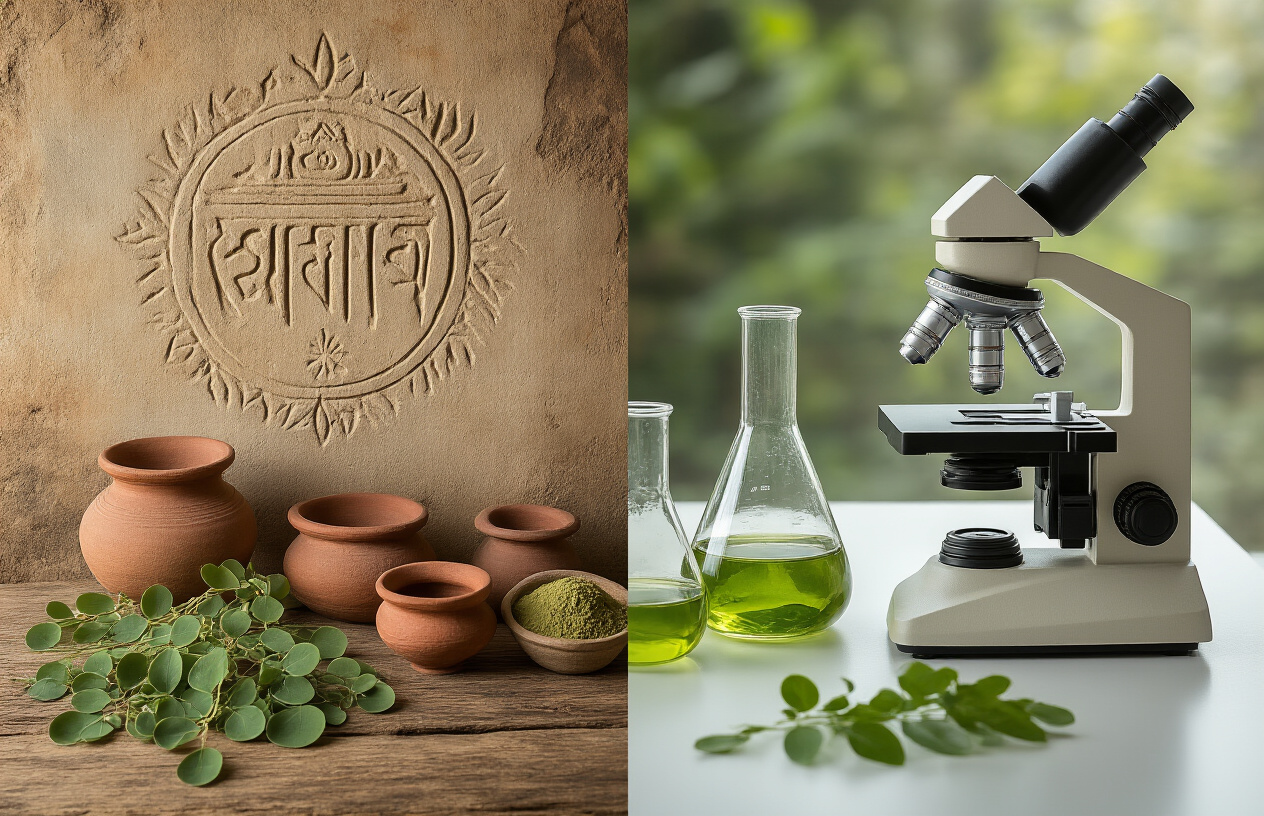
Traditional Uses Across Cultures for Centuries
You might be surprised to learn that the moringa tree has been quietly nourishing communities across Africa, Asia, and South America for over 4,000 years. Your ancestors in these regions recognized something special about this remarkable plant long before anyone had heard the word “superfood.”
In ancient India, Ayurvedic practitioners called moringa the “miracle tree” and used virtually every part of it. They prescribed moringa leaves benefits for everything from joint pain to digestive issues, while the roots treated respiratory problems. Traditional healers knew that what is moringa could be nature’s pharmacy in tree form.
African communities have relied on moringa as both food and medicine for generations. When you visit rural areas of Nigeria, Senegal, or Kenya today, you’ll still find families grinding fresh moringa leaves into powder to treat malnutrition in children and boost energy in adults. The moringa tree became so essential that many villages planted them specifically as “pharmacy trees.”
Traditional Chinese medicine incorporated moringa nutrition facts into treatments for inflammation and skin conditions. Meanwhile, Filipino folk medicine used moringa supplements in the form of leaf extracts to support nursing mothers and improve milk production.
What’s fascinating is how consistent these traditional uses remained across such diverse cultures. Whether you look at ancient texts from India or oral traditions from West Africa, the core moringa health benefits recognized by traditional healers align remarkably well with what modern science confirms today.
Recent Clinical Studies Validate Health Claims
Your skepticism about traditional remedies might soften when you see how modern research backs up centuries of folk wisdom about moringa benefits. Over the past two decades, scientists have conducted hundreds of studies on this moringa superfood, and the results consistently support what traditional healers have known all along.
Recent clinical trials show impressive results when you incorporate moringa powder into your daily routine. A 2018 study published in the International Journal of Food Science found that participants who consumed moringa leaves benefits experienced a 23% reduction in blood sugar levels within just three months. Another study demonstrated significant improvements in cholesterol profiles among adults who took moringa supplements regularly.
The antioxidant power of moringa has caught researchers’ attention too. When you compare moringa nutrition facts to other so-called superfoods, moringa contains seven times more vitamin C than oranges and four times more calcium than milk. Laboratory studies confirm that these nutrients remain bioavailable, meaning your body actually absorbs and uses them effectively.
Cancer research has also shown promising results. Multiple studies indicate that compounds in the moringa tree may help slow tumor growth and support your body’s natural defense mechanisms. While more human trials are needed, the preliminary findings align with traditional uses of moringa for general health and vitality.
Inflammation markers decrease significantly in people who regularly consume how to use moringa preparations, according to peer-reviewed research from major medical journals.
WHO Recognition as Malnutrition Solution
Your understanding of moringa’s global importance takes on new meaning when you learn that the World Health Organization officially endorses it as a solution to malnutrition worldwide. This recognition didn’t happen overnight – it came after years of documented success in addressing nutritional deficiencies in developing countries.
The WHO’s endorsement focuses specifically on moringa health benefits for combating protein-energy malnutrition, particularly in children and pregnant women. When you examine their reports, you’ll find compelling data showing that communities with access to moringa trees have significantly lower rates of stunting and wasting in children under five.
What makes this recognition particularly powerful is the WHO’s rigorous standards. They don’t endorse solutions lightly, and their approval of moringa as a malnutrition intervention speaks volumes about the scientific evidence supporting this moringa superfood. Their guidelines now include specific recommendations for how to use moringa in therapeutic feeding programs.
The organization has also supported the establishment of moringa cultivation programs in countries facing food security challenges. When you look at successful implementations in places like Haiti, Honduras, and several African nations, the results speak for themselves. Children who receive moringa supplements show marked improvements in weight gain, immune function, and overall development.
International aid organizations now regularly include moringa powder in their emergency nutrition responses. The fact that a single tree can provide complete nutrition – something the WHO has verified through extensive nutritional analysis – makes it an ideal solution for communities where traditional food sources are unreliable or unavailable.
Proven Health Benefits That Transform Your Wellbeing
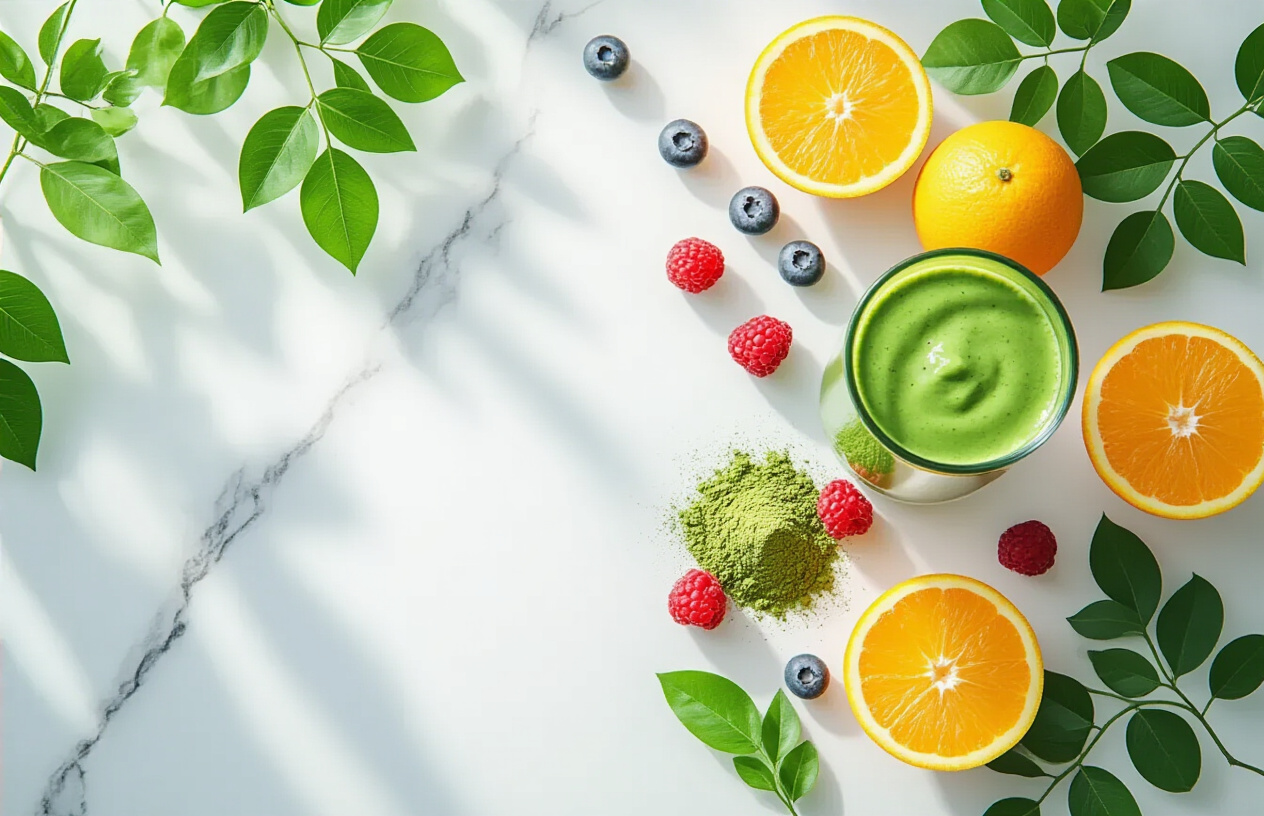
Blood Sugar Regulation for Diabetic Management
Your blood sugar levels can dramatically improve when you add moringa to your daily routine. Research shows that moringa leaves contain compounds called isothiocyanates that help your body process glucose more efficiently. When you consume moringa powder or fresh leaves regularly, you’re giving your pancreas the support it needs to maintain healthy insulin production.
Studies reveal that people who take moringa supplements experience significant reductions in fasting blood glucose levels within just a few weeks. The chlorogenic acid found in moringa works similarly to certain diabetes medications by slowing down sugar absorption in your intestines. This means you’ll experience fewer blood sugar spikes after meals, which is crucial for long-term diabetic management.
If you’re prediabetic or managing Type 2 diabetes, incorporating moringa into your diet can help reduce your reliance on medication over time. The fiber content in moringa leaves also plays a role in stabilizing your blood sugar by slowing digestion and preventing rapid glucose absorption.
Inflammation Reduction Throughout the Body
Chronic inflammation silently damages your body over years, but moringa’s powerful anti-inflammatory compounds can help you fight back. The quercetin, kaempferol, and other flavonoids in moringa work together to reduce inflammatory markers throughout your system. When you consume moringa regularly, you’re essentially giving your body natural tools to combat the root cause of many chronic diseases.
Your joints will thank you for adding moringa to your diet. Many people report reduced joint pain and stiffness after just a few weeks of consistent moringa use. The plant’s anti-inflammatory properties target the same pathways that cause arthritis pain, but without the side effects of conventional medications.
Beyond joint health, moringa benefits extend to reducing inflammation in your digestive system, cardiovascular system, and even your brain. This whole-body approach to inflammation reduction means you’ll likely notice improvements in energy levels, mood, and overall wellbeing as your body’s inflammatory burden decreases.
Cardiovascular Health Improvement
Your heart health gets a significant boost from moringa’s unique combination of nutrients. The high levels of potassium in moringa help regulate your blood pressure by counteracting sodium’s effects in your body. Regular consumption can lead to measurable improvements in both systolic and diastolic blood pressure readings.
Moringa’s beta-sitosterol content works to lower your cholesterol levels naturally. This plant compound blocks cholesterol absorption in your intestines, helping reduce LDL (bad) cholesterol while maintaining healthy HDL (good) cholesterol levels. Clinical studies show that people taking moringa supplements experience cholesterol improvements comparable to some prescription medications.
The antioxidants in moringa also protect your blood vessels from oxidative damage that leads to atherosclerosis. When you make moringa part of your routine, you’re investing in long-term cardiovascular protection that reduces your risk of heart disease, stroke, and other circulatory problems.
Enhanced Cognitive Function and Mental Clarity
Your brain performance can improve noticeably when you start using moringa regularly. The high concentration of vitamins E and C in moringa helps protect your brain cells from oxidative stress, which contributes to cognitive decline and memory problems. These antioxidants create a protective shield around your neurons, keeping them functioning optimally.
Moringa’s unique amino acid profile supports neurotransmitter production in your brain. The plant contains tyrosine and tryptophan, which your body uses to create dopamine and serotonin – chemicals crucial for mood regulation and mental clarity. Many people report feeling more focused and mentally sharp within days of adding moringa to their diet.
The iron content in moringa also plays a vital role in cognitive function by improving oxygen delivery to your brain. Better oxygenation means enhanced concentration, improved memory retention, and reduced mental fatigue throughout your day.
Natural Detoxification Support
Your liver works overtime to filter toxins from your body, and moringa provides powerful support for this vital organ. The plant contains compounds that enhance your liver’s natural detoxification processes, helping it break down and eliminate harmful substances more efficiently. Regular moringa consumption can help reduce the toxic burden on your liver from environmental pollutants, processed foods, and other daily exposures.
Moringa’s high chlorophyll content acts as a natural cleanser in your digestive system. This green pigment binds to toxins and heavy metals, helping your body eliminate them through normal waste processes. When you drink moringa tea or add moringa powder to smoothies, you’re giving your digestive system a gentle but effective detox boost.
The plant’s fiber content also supports detoxification by promoting regular bowel movements and healthy gut bacteria growth. A well-functioning digestive system is your body’s first line of defense against toxins, and moringa helps keep everything moving smoothly.
Simple Ways to Incorporate Moringa Into Your Daily Routine
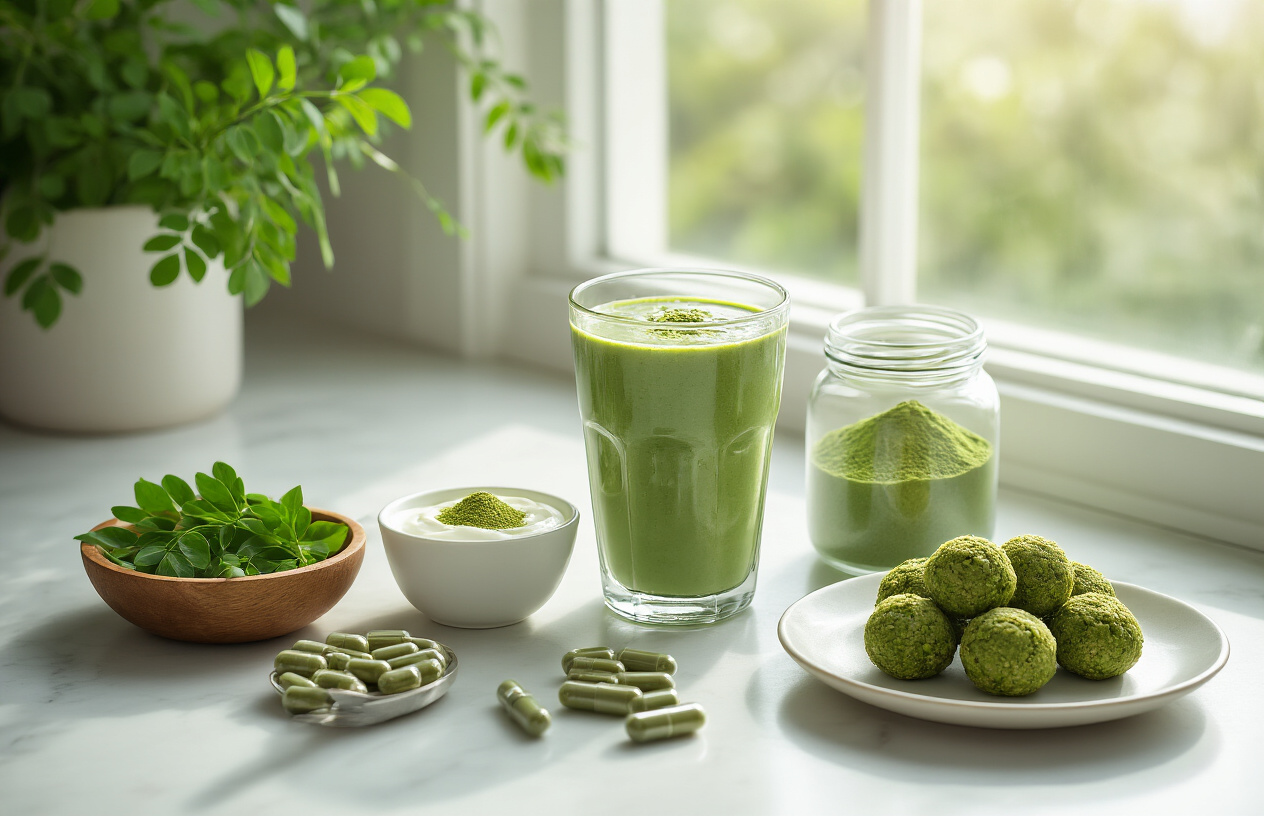
Powder Form for Smoothies and Beverages
Your easiest entry point into the world of moringa is through moringa powder. This vibrant green powder packs all the nutritional punch of fresh leaves in a convenient, shelf-stable form. Start with just half a teaspoon in your morning smoothie – the earthy, slightly peppery flavor pairs beautifully with tropical fruits like mango, pineapple, and banana. You can gradually increase to one or two teaspoons as your taste buds adapt.
Beyond smoothies, you can stir moringa powder into fresh juices, yogurt, or even plain water with a squeeze of lemon. Many people love adding it to their matcha lattes for an extra nutritional boost. The key is starting small and finding combinations that work for your palate. Green apples, spinach, and coconut water create a refreshing blend that masks any initial bitterness while delivering incredible moringa health benefits.
For hot beverages, mix the powder with a small amount of cool liquid first to prevent clumping, then add your hot tea or coffee. This method ensures smooth integration and maximum absorption of the moringa nutrition facts your body craves.
Fresh Leaves as Salad Greens and Cooking Ingredient
If you’re fortunate enough to access fresh moringa leaves, you’re in for a treat. These tender leaves work wonderfully as salad greens, offering a slightly spicy kick similar to arugula or watercress. Young leaves are the most tender and perfect for eating raw, while mature leaves work better when cooked.
How to use moringa fresh leaves extends far beyond salads. In many cultures, people sauté them with garlic and onions as a side dish, or add them to soups and stews during the last few minutes of cooking. The leaves wilt quickly, so timing is everything. You can also blend fresh leaves into pestos, chutneys, or herb sauces.
When harvesting from your own moringa tree, pick leaves in the early morning when they’re most nutritious. Always wash them thoroughly and remove any tough stems. Fresh leaves stay crisp in the refrigerator for about a week when stored in a damp paper towel inside a plastic bag.
Capsule Supplements for Convenient Dosing
Moringa supplements in capsule form offer the ultimate convenience for busy lifestyles. You get consistent dosing without worrying about taste or preparation time. Most high-quality capsules contain between 400-800mg of moringa powder per serving, making it easy to track your daily intake.
Take your capsules with meals to improve absorption and reduce any potential stomach sensitivity. Morning dosing works best for most people since moringa can provide natural energy. Look for moringa supplements that are organic, third-party tested, and free from unnecessary fillers or additives.
The beauty of capsules lies in their portability – you can maintain your moringa routine while traveling or during hectic workdays. However, remember that whole food forms like powder or fresh leaves often provide broader nutritional profiles compared to concentrated extracts. Consider capsules as your backup option or combine them with other forms for maximum moringa benefits.
Growing and Sourcing High-Quality Moringa
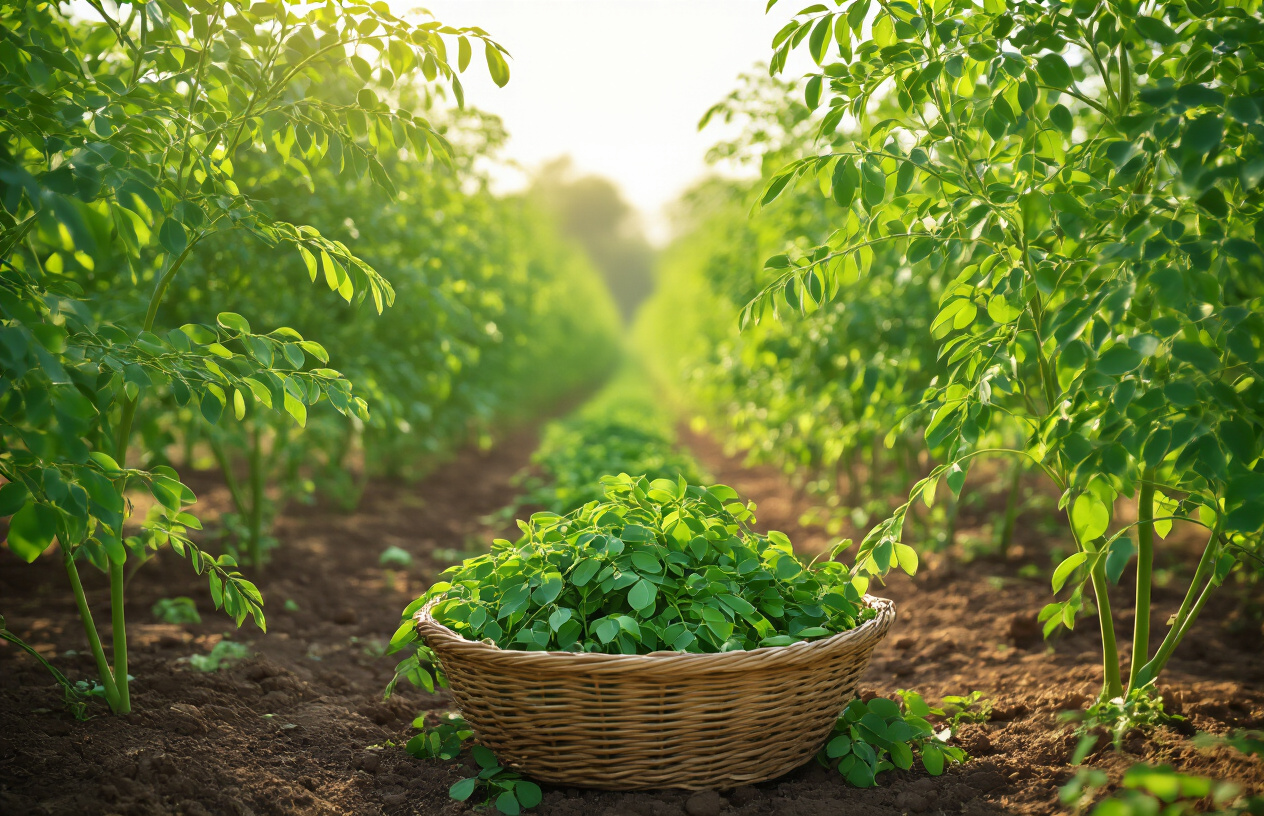
Home Cultivation Tips for Fresh Supply
Growing your own moringa tree brings you the freshest possible supply of this incredible superfood. You can successfully cultivate a moringa tree in your backyard, even in temperate climates, with the right approach.
Start with seeds from a reliable source – they germinate quickly and grow fast. Plant them in well-draining soil with plenty of sunlight, as moringa trees thrive in warm, sunny conditions. If you live in a colder climate, consider growing your moringa tree in a large pot so you can bring it indoors during winter months.
Water your moringa tree regularly but avoid overwatering, as these plants prefer slightly dry conditions once established. The beauty of moringa lies in its rapid growth – you can expect to harvest fresh moringa leaves within just a few months of planting.
Harvest young, tender leaves regularly to encourage new growth. Pick them in the morning when their nutrient content is highest. You can use fresh moringa leaves immediately in smoothies, salads, or teas, or dry them for later use as moringa powder.
Ethical Sourcing from Sustainable Farms
When you can’t grow your own moringa, choosing ethically sourced products makes a significant difference for both quality and global impact. Look for companies that work directly with small-scale farmers in regions where moringa naturally thrives, such as India, Africa, and Southeast Asia.
Sustainable moringa farming practices preserve soil health and support local communities. Fair trade certification ensures farmers receive proper compensation for their work, creating a positive cycle that benefits everyone involved.
Research the brands you’re considering – reputable companies openly share information about their sourcing practices and farming partners. They often provide details about how they support local communities and maintain environmental sustainability.
Choose suppliers who harvest moringa leaves at optimal times and process them quickly to maintain maximum nutritional value. This attention to detail in the supply chain directly impacts the quality of moringa supplements and powder you receive.
Quality Indicators When Purchasing Products
Recognizing high-quality moringa products protects your investment and ensures you get the maximum moringa benefits. Fresh moringa powder should have a vibrant green color – avoid products that appear brown or yellowish, as this indicates oxidation or poor processing.
Check the ingredient list carefully. Pure moringa products contain only moringa leaves with no fillers, additives, or preservatives. Quality moringa powder has a fresh, slightly bitter taste and a fine, smooth texture.
Look for third-party testing certificates that verify the absence of contaminants like heavy metals, pesticides, and harmful bacteria. Reputable brands provide these certificates readily and test each batch for consistency and purity.
| Quality Indicator | What to Look For | Red Flags |
|---|---|---|
| Color | Bright green | Brown or yellow tinge |
| Texture | Fine, smooth powder | Gritty or clumpy |
| Smell | Fresh, earthy | Musty or off odors |
| Packaging | Sealed, opaque containers | Clear plastic exposed to light |
Storage Methods to Preserve Nutritional Value
Proper storage keeps your moringa products fresh and maintains their impressive moringa nutrition facts. Store moringa powder in airtight containers away from light, heat, and moisture. Dark glass jars or opaque containers work best for preserving the nutrients that make moringa such a powerful superfood.
Keep your moringa products in a cool, dry place like a pantry or cupboard. Avoid storing them near the stove, dishwasher, or any heat source that could degrade the nutritional content.
Fresh moringa leaves should be used quickly or dried properly for long-term storage. If you’re drying your own leaves, do so in a well-ventilated, shaded area to prevent nutrient loss from direct sunlight.
Check expiration dates regularly and use older products first. While properly stored moringa powder can last up to two years, fresher products always provide better nutritional value and taste. Write purchase dates on containers to track freshness easily.

Moringa truly deserves its reputation as nature’s multivitamin. From its impressive protein content and essential amino acids to its powerful antioxidants and anti-inflammatory properties, this ancient superfood offers benefits that modern research continues to validate. You’re not just adding another supplement to your routine – you’re tapping into centuries of traditional wisdom backed by solid science.
Your journey with moringa doesn’t have to be complicated. Start small with powder in your morning smoothie or tea made from dried leaves, and gradually explore other forms as you discover what works best for you. Whether you choose to grow your own moringa tree or source high-quality products from trusted suppliers, you’re investing in a sustainable superfood that can genuinely support your health goals. Give moringa a chance to show you why it’s earned its place as one of the world’s most nutrient-dense foods.
